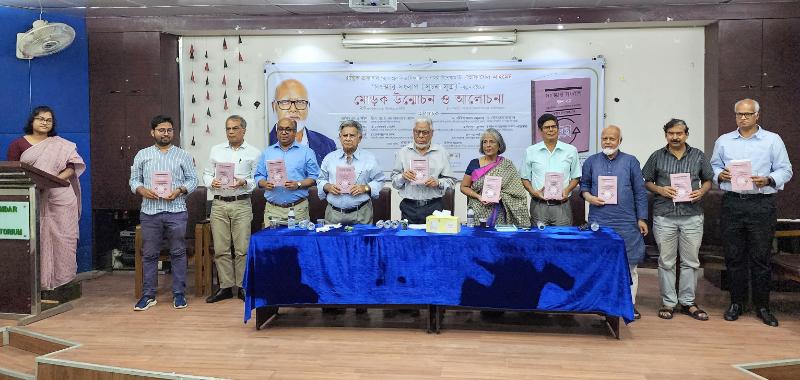Staff Correspondent
Published:2023-09-24 19:07:37 BdST
Discussion on the Launching of a New Book by Governance Expert Dr. Tofail AhmedRecommendations for the formulation of a proportional representation-based electoral system
One of the virtues of democratic governance is a fair, free, and impartial electoral system. However, this system can lead to the rule of the minority in a democracy. Adopting proportional representation in the electoral system could improve governance and address political crises.
These opinions arose during a discussion at Dhaka University. 'Granthik Prakasan' organized the event, coinciding with the launch of a book authored by prominent educationist and governance expert, Dr. Tofail Ahmed.
The discussion focused on the unveiling of the Bangla book "Sangskar Sanglap: Suchona Sutra (Rasthra, Nirrabcohn, Sashon-proshason O Songbidhan)."
Alongside Dr. Tofail Ahmed, Justice M.A. Matin, a former Appellate Division judge, Brig Gen (retd) M Sakhawat Hussain, renowned writer and former Election Commissioner; Abu Alam Md. Shahid Khan, former secretary of the local government department; Dr. Mobasser Monem, a professor in the public administration department at Dhaka University; Sharmeen Murshid, Chief Executive of Brotee and a former member of the National River Commission; Rezaul Karim Chowdhury, Executive Director of the COAST Foundation; Rajekuzzaman Ratan, Assistant Secretary of the Bangladesh Samajtantrik Dal-Basad; and Hasnat Qayyum, Chief Coordinator of the State Reform Movement, also shared their perspectives.
Dr. Tofail Ahmed highlighted that even after 50 years of independence, true people's representation in power or governance remains unrealized in our country. A universally acceptable electoral system is yet to be established. One solution to this crisis could be the implementation of a proportional representation-based electoral system.
In his book, he proposes five key reforms to address these challenges: proportional representation-based elections, the establishment of a bicameral National Parliament, a reorganization of the administration and judiciary at the grassroots level, a unified local government act, and all LG election under a single schedule, introduction of ‘postal Ballot’ for all absentee voters along with Bangladeshis living abroad .
Justice M.A. Matin emphasized that in our country, a government supported by a small portion of the population often rules over the majority. The way to rectify this situation is through proportional representation-based elections.
Furthermore, he stressed the importance of a bicameral parliament to prevent any one party from dominating the governance of the state.
Brig Gen (retd) M Sakhawat Hussain added that unless the culture of occupying polling stations is eradicated, fair elections will remain elusive, whether conducted using Electronic Voting Machines (EVMs) or traditional methods. Additionally, he emphasized the necessity of selection of candidate democratic.
Hasnat Qayyum pointed out that the existing electoral system doesn't reflect citizen aspirations, while Rajekuzzaman Ratan noted the significance of overseas workers in the economy without representation.
Rezaul Karim Chowdhury stressed the need for reforms to establish social justice and equitable wealth distribution.
Dr. Mobasser Monem called for local administration reforms, and Dr. Sharmin Murshid emphasized comprehensive state system reforms. Abu Alam Md. Shahid Khan suggested political parties should drive real reform.
Unauthorized use or reproduction of The Finance Today content for commercial purposes is strictly prohibited.


